Tour(nament) Diaries of a Chess Juggler!
For Chess players all across the world, travelling to Europe for tournaments is an exciting affair. Playing 3-4 tournaments in a row (because it's the most economical that way), adapting to a whole new continent, travelling, food, and of course -preparing for your games, all the while thinking "you better gain some rating points, you have travelled so far"! Shubham Kumthekar is a chess player, trainer and author, and recently he took a tournament trip to Europe with his friends. In the article below, he shares his experience and feelings in detail, also sharing instructive moments from the games played.
The Europe (Chess) Tour begins
Sometime in late January 2023, after a long day of work:
Mom: Do your students have an important tournament coming up?
Me: Yes
Mom: Are you currently preparing them for the tournament?
Me: Yes
Mom: Do you have tournaments coming up?
Me: Yes
Mom: Then how’s your preparation going…
Me: *Stares blankly*
The above real-life conversation between me and my mother illustrates the life of most adults planning to participate in chess tournaments. In particular those adults for whom chess playing is not their first vocation. While playing in tournaments is usually taken care of, the actual preparation part can be uncertain, with work swamping you from all directions. You try to squeeze in a few hours of practice, of course. But can you devote as much as to your heart’s content? The answer usually tends towards no. This was me right before I embarked on my trip to France and Germany that you are going to read much more about in the paragraphs to come.
I currently work with Upstep Academy, one of the biggest online chess academies in the world, as a coach and as head of Master Trainer Development. My roles kept me thoroughly occupied as the National Schools Chess Championships were being held at the end of January 2023, where several of our academy’s students were participating, including many of my own. Preparing the students for this major event, being onsite in Tamil Nadu for the same, all non-chess preparations for my trip - this timeline fast forwarded me from having around 2 months go for the trip straight to ‘suddenly’ being on the flight to Paris in early February!
Chess playing has slowly become secondary in my life. While I began coaching in some way quite early on, playing chess really started taking a backseat with interesting opportunities coming my way. This include working for a year in corporate, being part of the media team at chess events like the World Youth Chess Championships in 2019 and the first three IIFL Wealth Chess tournaments, working almost 6 years in multiple settings and capacities with FollowChess (including heading broadcasting operations, social media, and blog writing) right until December 2021, and now being associated with Upstep Academy since almost 3.5 years. I have been grateful for all the wonderful chances I have been presented with, but they came at the cost of playing chess actively, something I have always been fully aware about. As such, the idea of undertaking a dedicated ‘chess tour’ had been pushed to the corner, something I aimed to set right with this tour. So when Sagar himself asked me if I could share my trip experiences with the backdrop of my multiple chess roles over the years, it took me down the memory lane - right from my first chess moves twenty years ago to the current moment where I just finished my first proper ‘chess tour'.
Let’s re-track how the events panned out. My FIDE rating stood at 1794. I had three tournaments lined up - two in France and one in Germany. My travels were planned with six of my friends - all very strong players in their own right - with all of them playing in France and three of them continuing to Germany with me.
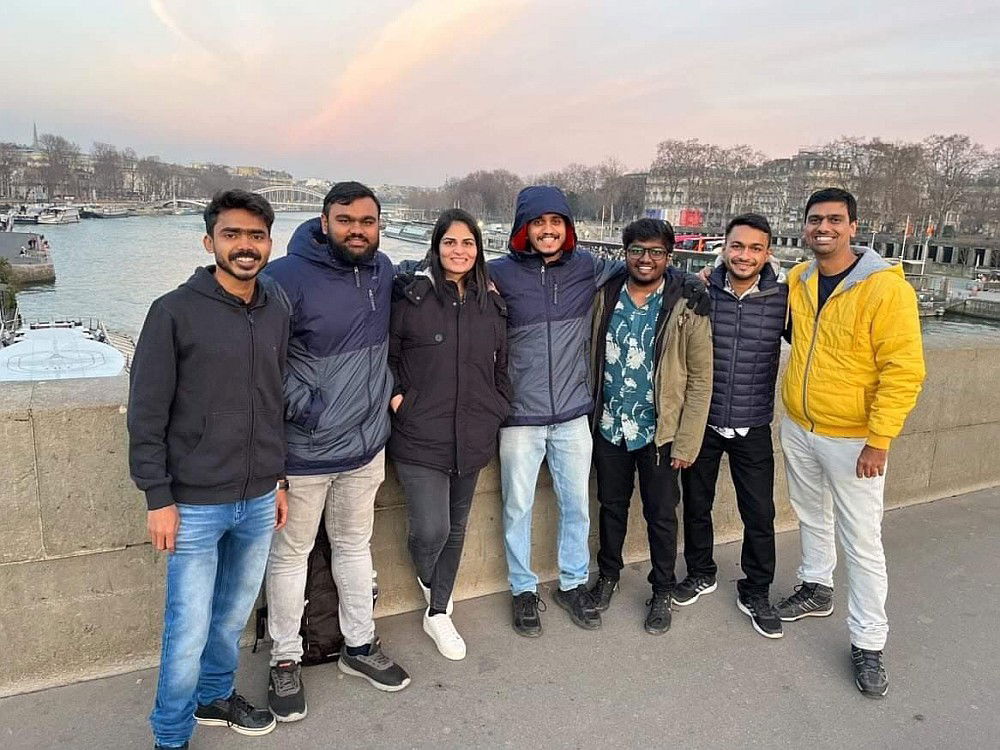
We sneaked in some time to tour around Paris. But before we knew it, we were already in the beautiful city of Rochefort, playing the first round of the 21st Rochefort International Chess Festival!
Participating in the B category, I started off quite shakily. I could only manage a draw in the first round against the talented 11-year-old Levanah Alcantara, despite a heavily favorable rating match-up. While I was tentative with my play, my opponent impressed with some confident moves and duly achieved a draw. She was even slightly better in the final position.
However, I wasn’t shaken. Before I began the trip, I looked at it as a series of 27 games rather than three separate tournaments. This helped me take the result in my stride, be patient and trust myself, and move forward with confidence. It was only after Round 4 that I felt truly happy about my play, but I made sure that the points kept coming anyway. Maybe it’s a good moment to plug in Cyrus Lakdawala’s book ‘Winning Ugly in Chess’!

In round 6, I had a win that put me close on the tournament leader’s heels with 5/6, despite the draw in round one. Round seven was an uneventful draw where I managed to get nothing with the White pieces with my opponent neutralizing my play quite well, but a win in round 8 really gave me hopes of a podium finish or even a title. I was in the group half a point behind the leader, needed a few results to go my way and most importantly, I needed a win. However, I only managed a draw and finished sixth, just outside the main prize list but good enough to finish first in my rating category. In the end, it was a slightly disappointing end to a tournament where I remained unbeaten and was constantly hovering on the top boards, including playing the last four games on board three!

The caravan then moved forward to the beautiful resort town of Cannes, where the 36ème Festival International des Jeux de Cannes was being held. Once again, I was slotted in the B category. The venue for the tournament was the same building where the Cannes Film Festival takes place, something that none of us saw coming!
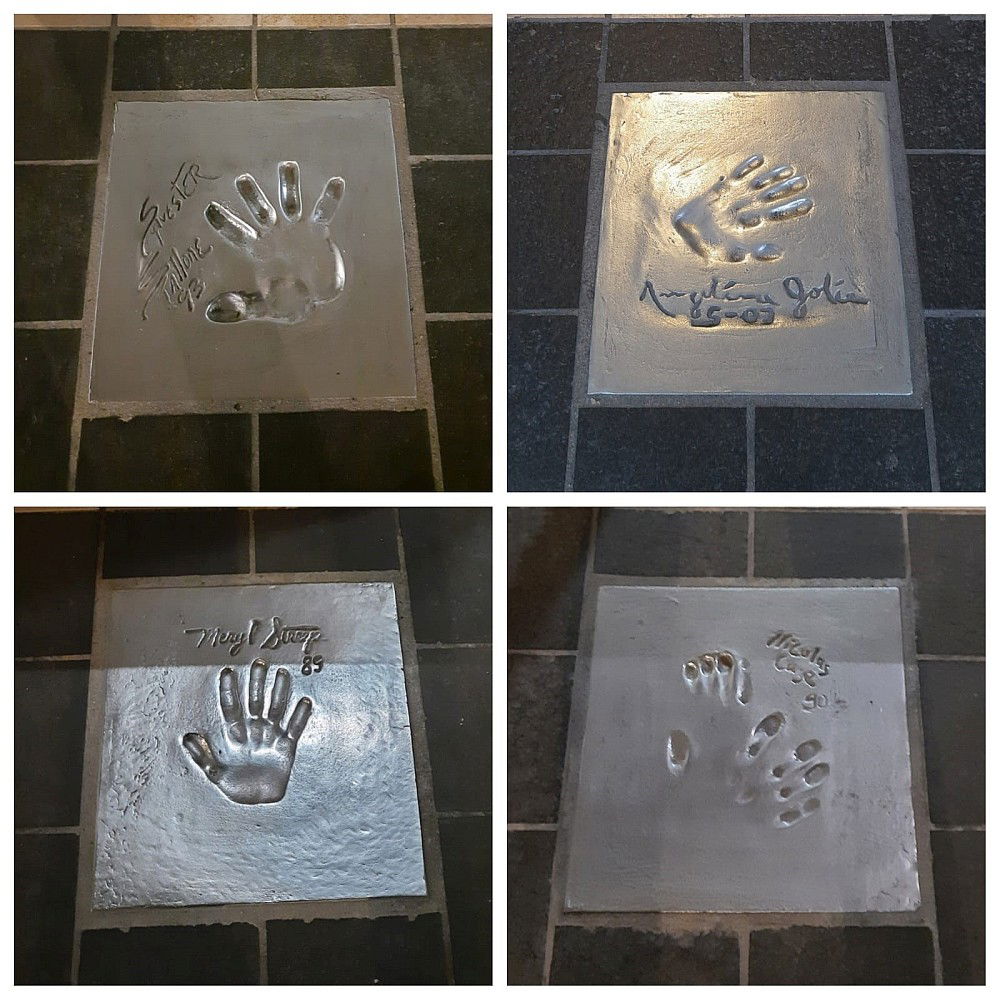
After a draw against a higher rated player in game one, I suffered my first loss of the trip in round two as I let slip a promising position with Black. I got back into the thick of things with a couple of good wins, including one against a higher-rated player. Then in round five, something strange happened. I secured a large advantage and was an exchange up inside 20 moves against a player rated 200 points above me. But a mistake from me allowed my opponent to plant a powerful Knight on e5, somehow creating a position which I had to find a way to break down. I tried for hours and my opponent played good solid chess, making me work hard for the full point. At some point, I even rejected a draw and kept trying to find a breakthrough. And then, lightning struck. I overpressed, blundered, and lost. All this after a game that lasted 5 hours 15 mins with the next round just 45 mins away!
I was distraught and couldn’t comprehend what had just happened. Regardless, I had to stage a comeback, and 45 minutes is all that I had to compose myself. To begin with, I decided to skip analyzing my game immediately. I grabbed a quick bite at the nearby McDonald’s, the only feasible option I could think of. All this while, I was alone with my thoughts, which can be dangerous. But I did something I have done quite often, took a ‘Done, Next’ approach, and told myself the game next up was important at that moment, not what had just happened. For the latter, there would be enough time to grovel over in the evening. I managed to come out all guns blazing to the next game and while I botched up a win against a higher-rated player once again, I did get a comfortable draw in the end. Was it a good result solely looking at this game? Definitely not. But was it a good result considering the debacle earlier in the day? To some extent. From there on, I drew one and won two in a row to finish the tournament on a high!
We had a bit of a breather following this as the action moved forward to the lovely little town of Bad Wörishofen in Germany, 90 kms away from Munich. Every single place we visited on the tour was quite scenic, but this cozy place captivated me endlessly for reasons even unbeknownst to me.

At some point, I joked if I could fight effectively on the chess board at such a scenic location! Such thoughts, albeit in jest, were quickly quelled with a victory against a 2100 player in the very first game. However, I knew this was only the beginning and that I would end up facing a host of strong players. After all, this was the only time I could play the ‘A category’ on the tour, and I was really looking forward to it. As it turned out, I faced my room-mate FIDE Master Aniruddha Deshpande in the second round. The dynamics of facing a room-mate are always intriguing, but the only real thing you can do is to take it like any other game, prepare like any other game, and give your 100% like any other game! The game lasted 5+ hours but the result was hardly in doubt - ‘Ani’ dominated the game and deservedly won it. Over the next six games, I notched up every result twice and scored three points out of six, before closing the tournament with a back-and-forth draw against a FIDE Master. With a final tally of 4.5/9, I comfortably finished first in my rating category!
We traveled to Munich, toured around the city for a few days, before finally returning back home. The trip had come to an end, with a boost of 127 FIDE rating points for me. While the rating gain seems great, I strongly believe I could have played and done even better, something that only motivates me further for future tournaments.
Looking back at the tour, I was surprised on multiple counts, learning a good deal along the way. I would like to outline the learnings for the readers, with the goal of making it easier for those planning ‘chess trips’ in the future.
The importance of a great group
A good group can impact you in more ways than you think, and I was lucky to have some wonderful people around for these 37 days. We discussed each other’s games and interesting lines, assisted each other with preparation and shared our collective wisdom, helped each other out in times of various needs, and just overall understood the kind of atmosphere to maintain and the approach to take in tough situations, be it on a conscious or subconscious level. One incident that stands out for me was from a double-round day at the Rochefort tournament. I wasn’t in the best shape and for more reasons than one, had taken an early draw in the morning round. It was disappointing since it put me further behind in contention for the tournament title. Grumpily going to our friends’ room, I watched my friends discuss their rather interesting games, and I hardly participated in these discussions. However, these sparkling games were enough motivation for me and I remember feeling inspired. Add to it the kind of banter you can expect with a group this large, I went into the afternoon round feeling more than refreshed and ended up playing a game that was easily my personal favorite from that event!
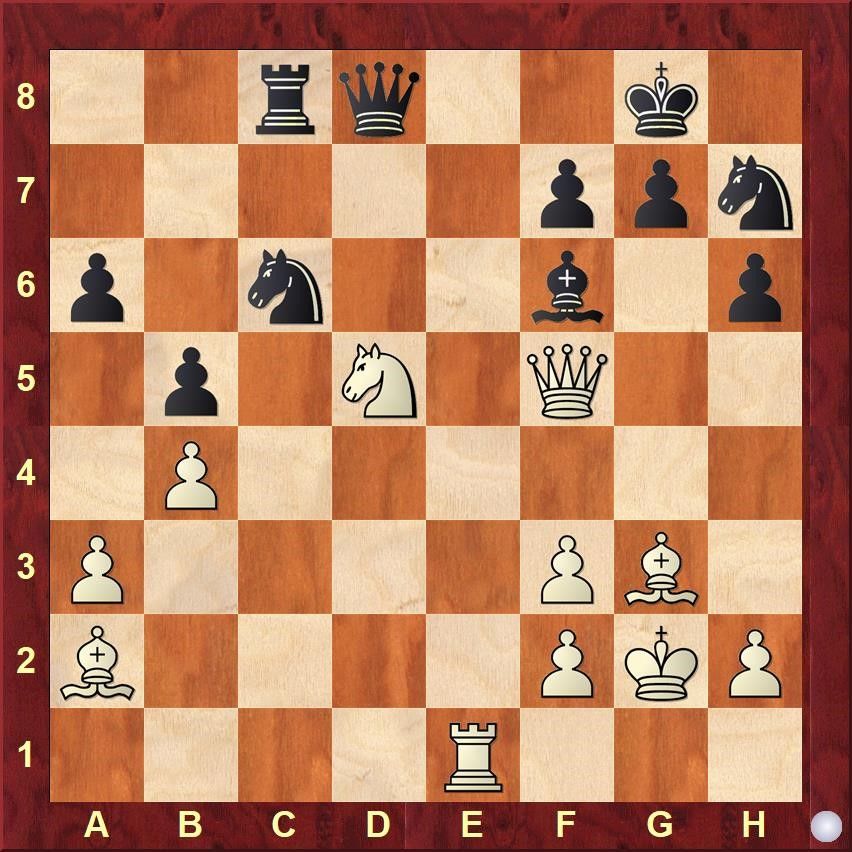
The benefits of playing multiple tournaments in a row
I always knew and understood the perks of participating in multiple tournaments on the trot, aiming for some sort of a ‘circuit’. However, it wasn’t until this trip that I actually got a chance to play in three tournaments back-to-back. What surprised me was just how naturally things came to me towards the end of the second tournament and in the entirety of the third tournament. It felt like being in a flow state, and it helped. Not just that, the preparation undertaken in an earlier tournament can sometimes come in handy in a later game, and you will remember the ideas quite clearly due to the recency of preparation. Of course, the schedule of the tournaments matters when planning such consecutive events. So if there are double or triple rounds involved on multiple days, it could take a lot out of you. In such cases, seeking breaks between tournaments and even planning a lesser number of tournaments could be the way to go.
The approach to pre-tournament preparation when pressed for time
If someone holds me as I am rushing to take a Mumbai local to work and asks me to list only two things to prioritize before a tournament, I’ll quickly blurt ‘openings’ and ‘tactics & calculation’ before scurrying off to compensate for the lost precious seconds, hoping I still get the train!
Indeed, with around 2 months to go for my tournaments, I had a bunch of areas planned to work on. But as the tournaments got closer and the increasing work commitments left me with little time, I knew I had to consciously prioritize. Barring a couple of self-training sessions on other areas, I channelized myself to focus on openings and tactics & calculation. And in particular, the latter. The logic was simple: For someone out of touch with competitive chess for close to half a year, staying tactically sharp and being able to calculate reasonably well was on top of the to-do list. Sure, the openings could not be ignored and certain critical variations were covered by me prior to the trip. But I also knew I would have some time on a daily basis to revise and prepare my openings during the tournaments. Tactics & calculation though? Non-negotiable!
The sheer amount of non-chess preparation prior to the trip:
It’s obvious that a 1.5-month trip to foreign lands will take a good deal of packing. But the time and effort that actually went into getting everything together for this trip astounded me, and I must admit I underestimated it. Be it applying for the visa or planning the internal travels or shopping for groceries to carry on the trip, it takes more time and effort than you might think!
Just how fast time can fly during the tour:
I would have done a few things differently if I were aware about how fast the time could pass during the tour. Sure, a big chunk of the time is taken by the games and the analysis & preparation that goes with them. But on a trip like this, you will quite often be staying in an apartment and tasks like cleaning, cooking, getting the groceries, etc creep into your schedule. Plus, there could be emergencies or planning related to internal travel, and the actual travel of course. Add to it my case where I was also working during the trip, it makes for a jam-packed schedule!
------
Now, on to some chess itself! To conclude, I have picked a few positions for the readers to solve, ranging from easy to challenging. As mentioned earlier, me and my friends often analyzed and discussed a lot of chess during the trip and there will always be games that leave a mark on you. As such, the puzzles come from mine as well as my friends’ games. Have fun!
Puzzle 1: Shubham Kumthekar - Arun Manukonda, Bad Worishofen

Puzzle 2: Variation from Shubham Kumthekar - Philippe Beaufils, Rochefort

Puzzle 3: CM Vedant Pimpalkhare - GM Iniyan, Bad Worishofen

Puzzle 4: Akhilesh Nagare - Richard Woerl, Bad Worishofen
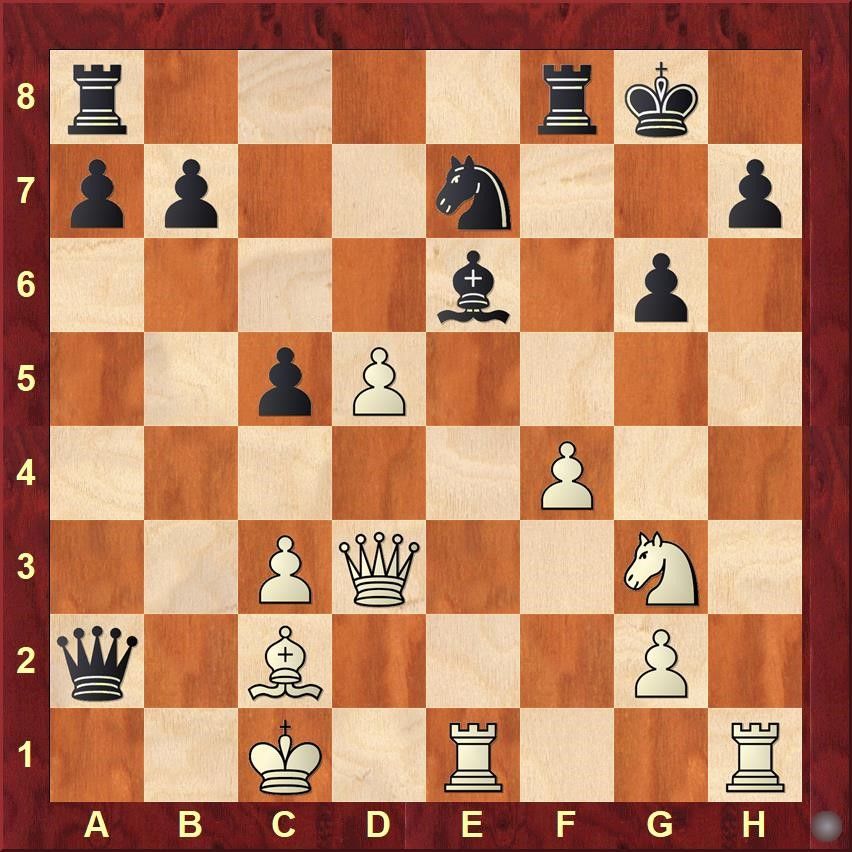
Puzzle 5: FM Aniruddha Deshpande - IM Remy Degraeve, Rochefort
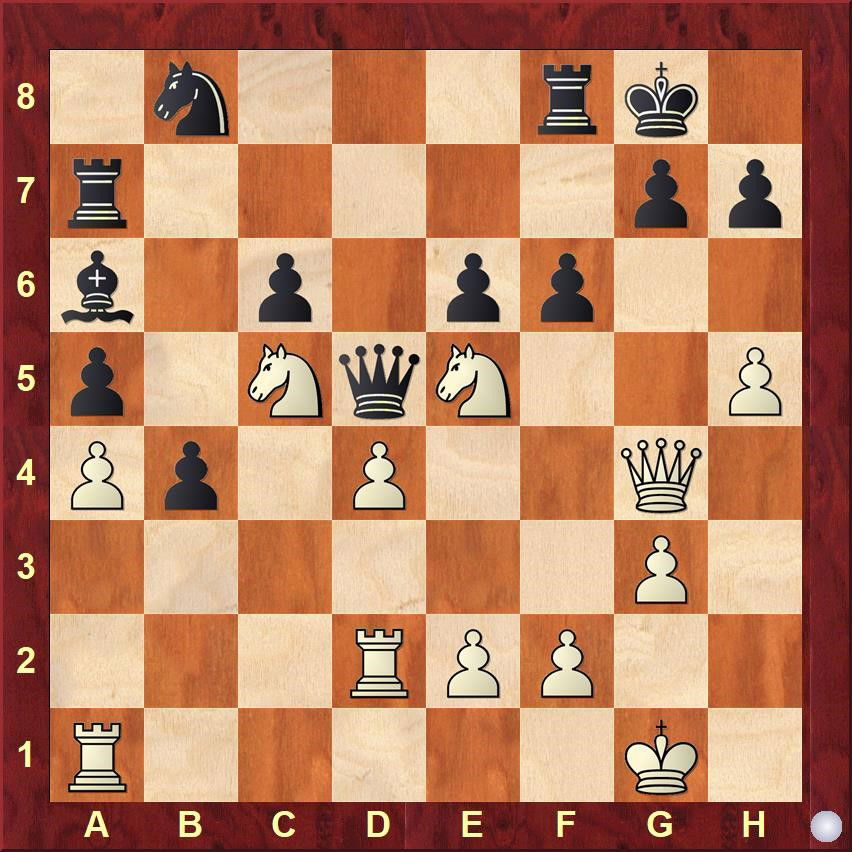
Solutions
(1) Checkmating patterns in the endgame are always a treat! Here, White played 39.Be6 and Black had to give up his Queen to bail out of the mate. It helps that the e3 pawn is going nowhere, thanks to the Knight on d4.
(2) This position was part of my calculation and didn’t actually surface on the board. After 24.Rd7 Nc2, I had calculated the aesthetically pleasing 25.Ne6+ Ke8 26.Bb5! And Black’s position is collapsing.
(3) White went 43.gxf5! Now after 43…hxg5 44.Qd7+ Kh6 45.Qf7! is the key idea (although 45.fxg6 is also possible). The game ended quickly after 45…Qb1+ 46.Kh2 Qxf5 47.Qf8+ Kh7 48.Qf7 leading to a draw by perpetual check.
(4) After the given sequence of moves, White struck with 25.Rxg6+! With Bb3+ coming next regardless of the way Black captures the Rook, Black resigned. Like Akhilesh mentioned after the game, this was a good example of seeing half a move ahead than your opponent.
(5) White proceeded confidently with 22.e4 Qd6 23.Ng6! In the game, Black played 23…hxg6 and after White’s 24.hxg6, the White Queen penetrated into the Black position via h5 and h7. White had a winning attack. If Black doesn’t capture the Knight on g6 and goes 23…Re8, White keeps up the momentum with 24.e5!
About the Author

Shubham Kumthekar is a 27-year-old chess trainer and chess player from Mumbai. He learnt the moves at age seven and has been fascinated by the game ever since. Currently rated 1921, Shubham is a coach and head of Master Trainer Development at Upstep Academy, one of India's biggest online chess academies. In the past, he has managed broadcasting operations and social media at FollowChess. He wishes to remain associated with chess throughout his life, be it through playing, coaching, writing and more!










































